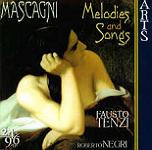The last–and only–time I encountered tenor Fausto Tenzi was on a recording of Donizetti’s Imelda de’ Lambertazzi on Nuova Era, recorded in 1988. I was impressed by his full tone and found him stylish. The intervening years have not harmed his voice in any irreparable manner, but to judge by his performances of these early songs and melodies by Mascagni, the tone has become beefier and some bad habits have crept in. He struggles a bit on the way up to high notes and seems incapable of altering his volume: if he starts off trying to sing sweetly or tenderly, the tone soon returns to mezzo-forte or above.
That having been said, I’m not sure I’d like to hear any tenor sing 50 minutes of this music. Three songs at a time might be fine; many contain Mascagni’s nice melodic gift and the words are well-set. But there is an overriding sentimentality, indeed gushiness to these pieces that makes sitting through a whole bunch of them difficult. The subjects are the usual–lost love, the evening, the sounds of a bird–but the treatment by the young Mascagni does not make them irresistible. And as mentioned, the sameness of delivery doesn’t help. Roberto Negri’s accompaniments, on three different instruments, are more sensitive than the singing. You’ll know if you need this.
































